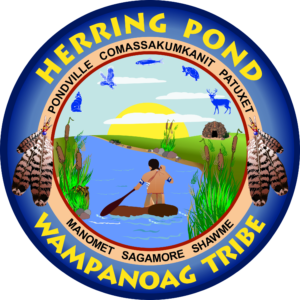We are not a “conquered” people. We are a resilient and determined people – well aware of our history!

Kuwnee puyômuw! Welcome All!
WE are THE Wampanoag Tribe of Plymouth Indians known Present-day as the Herring Pond Wampanoag Tribe, also identified in historical documents as Patuxet, Comassakumkanit, The Herring Pond Indians, The Pondville Indians and Manomet. We have lived on these lands for thousands of years. We are a tribal community whose ancestral homelands are located at the heart (Ground Zero) of the long history of colonization and appropriation of indigenous lands in North America: Plymouth and Barnstable counites Massachusetts.
One of the remaining historic tribes in the Commonwealth of Massachusetts today, we are the Herring Pond Wampanoag Tribe. For thousands of years the Herring Pond Wampanoag Tribe has continuously occupied this region. Of all the remaining “Historic Tribes” in Commonwealth of Massachusetts today the “Herring Pond Indians” are the only Tribe to have had lands in the Town of Plymouth and Bourne allotted to us, and we have never ceded its ancestral rights to these homelands by treaty or sale.
Our people have continued to live within our homeland, and today we continue our struggle to protect our cultural heritage and land rights as an indigenous people. Our sacred places include our cemeteries, our Dina Path property (a 6-Acre parcel deeded back to the Tribe by the Town of Plymouth in late 2019) and our beloved Pondville Meetinghouse (Pondville Indian Church) located in Cedarville a small village at the Southern borders of Plymouth adjacent to Great Herring Pond. Built from an 1838 Petition by “John Conet and the Herring Pond Indians” our Meetinghouse at that time was at the center of our tribal existence and is so today. Although the original 200-Acre Lot has been greatly diminished — against all odds, we still have care and custody of this building today. To us, these are the places of our ancestors, and we are obligated to protect and to preserve, for our ancestors before us, our children now and all of our descendants to come.
As made clear over 150 years ago in what is known as the “Earle Report” (“Report to the Governor and Council, Concerning the Indians of the Commonwealth,” by John Milton Earle, submitted to the General Court in 1861), the Tribes of Massachusetts knew then that “the State has large funds drawn from the sale of lands which would have been theirs” (Earle Report, p. 13) among other historical documents. The Herring Pond Wampanoag Tribe has long known that their historical lands have been subjected to externally imposed processes intended to legitimize the taking of our lands, and to convey the idea that such processes are an inevitable aspect of European, and Euroamerican, “conquest.” However, we are not a “conquered” people, we are a brave, resilient and determined people, well aware of our history and committed to preserving our tribal rights into the future.
We now face the challenge of preserving what remains of our historical reservation lands (post allotment) which previously contained three separate parcels, mostly in Plymouth but partly in Bourne which in total was about 3,000+ acres, namely the Great Lot (about 2,600 acres), the Meetinghouse Lot (about 200 acres) and the Herring River Lot know to the tribe in the 21st Century as “The Valley” (about 400 acres) of which most of it was lost, stolen or conveyed for reasons unknown to the Tribe. WE WILL NOT BE ERASED!”
